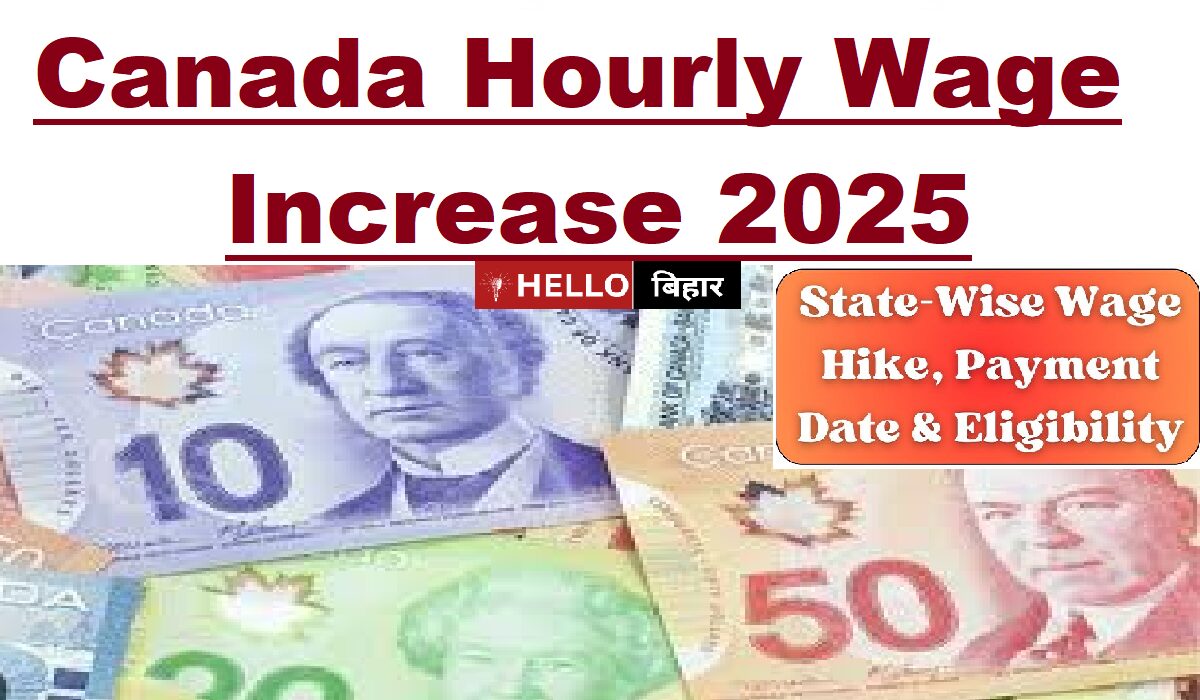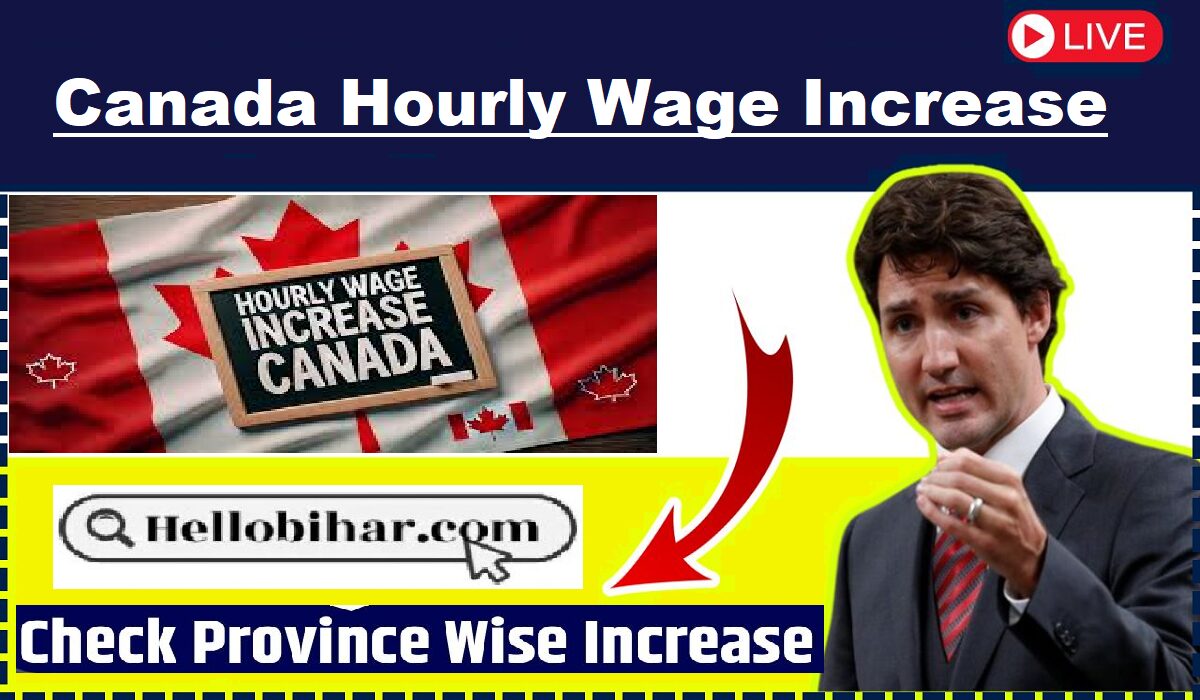Canada Hourly Wage Increase 2025:- Canada has consistently been a nation committed to protecting the rights of its workers, and 2025 will mark another significant year with the implementation of hourly wage increases across the country. Understanding these changes is crucial for workers, employers, and policymakers alike. In this article, we will delve into the specifics of the Canada Hourly Wage Increase 2025, focusing on minimum wage rates, key dates, province-wise breakdowns, and frequently asked questions to ensure you are fully informed.
Minimum Wage Rates by Province in 2025
Each Canadian province and territory sets its own minimum wage, reflecting regional economic conditions, cost of living, and labor market dynamics. As of 2025, many provinces will implement notable increases in their minimum hourly wages. Below is a province-wise breakdown:

Alberta
Alberta has announced a rise in its minimum hourly wage to $16.50 in 2025. This increase is aimed at addressing inflation and improving the standard of living for workers in the province.
British Columbia
British Columbia, a province with one of the highest living costs, will see its minimum wage rise to $17.00 per hour starting January 2025. This aligns with the province’s commitment to maintaining fair compensation for its workforce.
Manitoba
Manitoba is set to raise its minimum wage to $15.30 per hour in October 2025. This change supports low-income workers and aligns with the province’s inflation adjustments.
New Brunswick
New Brunswick’s minimum wage will increase to $15.25 in April 2025, benefiting thousands of workers across various industries.
Newfoundland and Labrador
In 2025, the minimum wage in Newfoundland and Labrador will reach $15.50 per hour, helping workers cope with rising living expenses.
Nova Scotia
Nova Scotia will introduce a minimum wage increase to $15.65 per hour in April 2025. This adjustment reflects the province’s efforts to support its labor force.
Ontario
Ontario, the most populous province, will implement a new minimum wage of $16.55 per hour as of October 2025. This increase is part of the government’s broader strategy to support economic growth and workforce development.
Prince Edward Island
Prince Edward Island will raise its minimum wage to $15.40 per hour in June 2025, ensuring fair wages for its workers.
Québec
Québec will see a rise in its minimum wage to $16.00 per hour by May 2025, benefitting a wide range of workers across industries.
Saskatchewan
Saskatchewan’s minimum wage will increase to $15.20 per hour in October 2025. This reflects the province’s effort to address the challenges of inflation.
Territories (Yukon, Northwest Territories, Nunavut)
The territories will also see adjustments to their minimum wages, with Yukon’s wage increasing to $16.80, Northwest Territories to $17.20, and Nunavut to $17.50 by mid-2025. These changes acknowledge the unique economic and geographic challenges faced by workers in these regions.
Key Dates and Facts for Canada Hourly Wage Increase 2025
Key Implementation Dates
- January 2025: British Columbia wage increase to $17.00.
- April 2025: New Brunswick and Nova Scotia wage increases.
- May 2025: Québec wage increase to $16.00.
- June 2025: Prince Edward Island wage increase.
- October 2025: Increases in Ontario, Manitoba, and Saskatchewan.
Significant Facts
- Inflation Adjustment: Many provinces have linked wage increases to inflation rates to ensure real income growth for workers.
- Youth and Student Minimum Wage: Some provinces, such as Ontario, maintain lower minimum wages for students under 18 working less than 28 hours per week.
- Sector-Specific Wages: Certain industries, like agriculture and hospitality, may have sector-specific wage regulations.
- Living Wage Movement: In some provinces, discussions continue about adopting living wage policies, which go beyond the minimum wage to account for the actual cost of living.
Canada Minimum Wage Increase 2025: What Workers Need to Know
Impact on Workers
The wage increases in 2025 aim to reduce poverty, improve purchasing power, and enhance quality of life. For workers, these adjustments represent a step toward greater financial stability, particularly for those in low-income brackets.
Opportunities for Skill Development
With higher wages, many workers will have better access to education, training, and skill development opportunities, potentially leading to career advancement.
Employer-Employee Dynamics
Employers may face higher labor costs, but this can be offset by improved employee satisfaction, retention, and productivity. Workers are encouraged to communicate with their employers about how these changes might affect their roles.
Province-Wise Eligibility for Canada Hourly Wage Rate in 2025
General Eligibility Criteria
- Employment Status: The hourly wage increase applies to full-time, part-time, and temporary workers.
- Age: Most provinces set the same minimum wage for workers aged 18 and older, with exceptions for students or youth.
- Sector: Some industries have unique wage structures, which may influence eligibility for minimum wage rates.
- Residency: Workers must be legally eligible to work in Canada to benefit from minimum wage protections.
Province-Specific Eligibility Highlights
- Ontario: Youth under 18 working less than 28 hours per week are eligible for a lower minimum wage.
- British Columbia: Agricultural workers paid by piece rates may see adjustments reflecting the new minimum wage.
- Quebec: Workers in the hospitality sector, such as servers, may have different minimum wage rates inclusive of tips.
Canada Hourly Wage Increase 2025: Frequently Asked Questions (FAQs)
1. What is the purpose of the Canada Hourly Wage Increase 2025?The wage increase aims to support workers by addressing inflation, reducing income inequality, and improving overall living standards.
2. How are minimum wage rates decided in Canada?Minimum wage rates are set by individual provinces and territories, considering factors like inflation, cost of living, and economic conditions.
3. Will all workers benefit from the wage increase?Most workers earning minimum wage will benefit, but exceptions exist for specific sectors or youth wages. Employers are required to comply with provincial regulations.
4. How do wage increases affect small businesses?While higher wages may increase labor costs, they can also lead to higher employee morale, productivity, and retention, potentially offsetting the financial burden.
5. What happens if an employer fails to comply with the new minimum wage rates?Employers who fail to meet the minimum wage requirements can face penalties, including fines and legal action, depending on provincial labor laws.
6. Are there any federal minimum wage changes in 2025?Yes, the federal minimum wage for federally regulated workers will also increase, aligning with inflation rates and regional economic factors.
7. How does the minimum wage compare to the living wage in Canada?While the minimum wage ensures a basic income for workers, the living wage accounts for the actual cost of living, which is often higher. Many advocates are pushing for living wage policies.
8. How can workers ensure they receive the correct wages?Workers should familiarize themselves with the minimum wage rates in their province or territory and report any discrepancies to labor authorities.
9. Will the wage increase affect unemployment rates?While some predict potential job losses due to higher labor costs, studies have shown that moderate wage increases generally have minimal impact on employment levels.
10. How does Canada’s minimum wage compare internationally?Canada’s minimum wages are competitive globally, particularly in provinces like British Columbia and the territories, where rates are among the highest.
Conclusion
The Canada Hourly Wage Increase 2025 represents a pivotal moment for workers and employers alike. With new minimum wage rates across provinces and territories, millions of workers will benefit from higher incomes, contributing to improved quality of life and economic stability. As these changes take effect, staying informed about the specific rates, eligibility criteria, and implementation timelines will be essential for maximizing their impact. Whether you’re a worker striving for financial stability or an employer navigating new labor costs, understanding the Canada Hourly Wage Increase 2025 is crucial for adapting to this evolving landscape.

